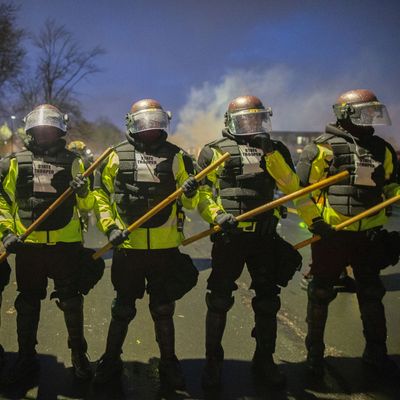
The three-week criminal trial of Derek Chauvin ended on Tuesday with three guilty verdicts, forestalling mass protests of the sort Minnesota officials had spent weeks anticipating and deploying armed agents to suppress. More than a legal referendum on Chauvin’s conduct, the trial was a bilateral effort to defend the virtues of policing. The dishonesty this required from both prosecutors and the defense — and the workaday violence it obscured — should leave no doubt that justice for people like George Floyd has nothing to do with the rare officer an unjust institution chooses to rebuke.
The crux of the prosecution focused on whether Chauvin’s behavior was deviant enough to warrant consequences. Close to a dozen former and current police officials — mostly from Minneapolis, but elsewhere too — testified against the former officer, who last spring was video-recorded kneeling on Floyd’s neck for more than nine minutes until the 46-year-old Black man died. Minneapolis police chief Medaria Arradondo said Chauvin had violated department policy by his actions. MPD inspector Katie Blackwell did the same, as did Lieutenants Richard Zimmerman and Johnny Mercil and Sergeant Jody Stiger of the Los Angeles Police Department, among others. Taken together, these officials composed a collective effort to draw a hard line between Chauvin’s conduct and policing by the book — what is permitted by department policy and, in Stiger’s case, national norms. “Totally unnecessary,” said Zimmerman in characteristic testimony. “If your knee is on a person’s neck, that can kill them.”
Killing people is not usually a problem for American police, who on average kill roughly 1,000 civilians a year, including fatally shooting more than 400 unarmed people total since 2015, according to the Washington Post. Thus, the rebuke of Chauvin by his fellow officers should not be interpreted as institutional opposition to needless death. It is a preservationist response to the questions of legitimacy that arise when an officer gets caught on camera torturing a handcuffed man to death, sparking some of the largest protests in U.S. history. These questions are compounded by growing public recognition that this behavior is not unusual. In the years since Eric Garner was video-recorded being choked to death by a police officer in Staten Island in 2014, the sentiment that police violence is a major problem in the U.S. has come to be shared by roughly half of American adults, while about two-thirds feel that the criminal-legal system treats police too leniently. Departments nationwide, and the Minneapolis Police Department in particular, face unprecedented threats to their primacy and local esteem in the form of budget cuts and even proposals to disband them.
Throwing Chauvin under the bus in court is a good way to reassure people that this system can and does work the way they want it to. This is a goal of interest to the prosecutors, who during the trial found themselves in the rare position of pressing charges against a police officer. They made their view clear in their closing arguments on Monday. “This case is called the State of Minnesota v. Derek Chauvin,” said prosecutor Steven Schleicher. “This case is not called the State of Minnesota v. the Police. Policing is a noble profession … and there is nothing worse for good police than a bad police, who doesn’t follow the rules, who doesn’t follow procedure, who doesn’t follow training, who ignores the policies of the department, and the motto of the department: ‘To protect with courage, to serve with compassion.’”
Not six years ago, officers within the same department killed Jamar Clark, then razed the protest camp established by residents to oppose them. While Chauvin was choking Floyd’s life out last year, several of his fellow officers stood by and watched, including Alex Kueng, whose mother described his reason for joining the department to the New York Times: “That’s part of the reason why he wanted to become a police officer — and a black police officer on top of it — is to bridge that gap in the community, change the narrative between the officers and the black community.” That’s one department over just a handful of years. Drive a few miles in any direction and the story is similar: the killing of Philando Castile in 2016, the killing of Daunte Wright last week. Most of these officers were determined to have abided by department policy.
Policing is not an intrinsically noble profession. It is a profession, plain and simple, that attracts some applicants who may behave nobly and others who do not, and that generally encourages people to be worse versions of themselves — to ignore or justify the brutality of their colleagues, to excuse violence, to reject accountability. Whether there are more “good” or “bad” police does not change the fact that the police will not stop killing people needlessly. The parameters of acceptable law-enforcement conduct are so warped that prosecutors could not feasibly expect a conviction for Chauvin by arguing that it’s not legal to kneel on someone’s neck until they die. They had to demonstrate that kneeling on someone’s neck until they die warranted consequences because it violated a specific police-department policy, because it did not fit the “reasonableness” standard enshrined in law by Graham v. Connor in 1989: that if a “reasonable” police officer would have done the same thing under the circumstances, then it is legal.
This is not a standard — or system — that has to be preserved, regardless of Tuesday’s guilty verdicts. It is a license for the police to keep doing what Americans are in the streets protesting them for doing, and insisting it is nonnegotiable under the auspices of public safety. Chauvin’s former colleagues may have come out in force to rebuke him during his trial. But the result was less justice than an unusually strident effort toward self-preservation. And it probably worked.






























